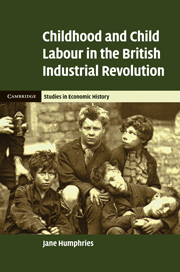9 - Apprenticeship
Published online by Cambridge University Press: 06 December 2010
Summary
Introduction
While child labour has generally been condemned, the attitude to its combination with on-the-job training, as in an apprenticeship, is more ambivalent. The classic economists were famously suspicious of apprenticeship, and modern economic historians have followed their lead in interpreting it as a hangover from a pre-modern immutable world dominated by monopolistic guilds and restrictive corporation. The recent rethinking of guilds and their economic role has spilled over into renewed interest in apprenticeship and a less negative stance on its contribution to economic growth (Ward, 1997; Epstein, 1998; Humphries, 2003; De Munck et al., 2007). This chapter uses the autobiographers' experience both to fill gaps in historians' account of apprenticeship and to explore its role in the British industrial revolution.
Classic apprenticeship involved indentures which bound master and apprentice for a pre-specified period during which the master undertook to teach the apprentice, provide him with board and lodging, introduce him to the modus operandi of his trade and safeguard his moral welfare. In return, the apprentice promised to work for his master as he trained and sometimes provided a premium or cash payment. While apprenticeship's legal history is well known, few historians have been willing to estimate its quantitative significance and changes in its popularity over time.
The accounts offer insight into basic trends. Apprenticeship was widely thought to be of vital importance both to boys' prospects and to families' futures.
- Type
- Chapter
- Information
- Childhood and Child Labour in the British Industrial Revolution , pp. 256 - 305Publisher: Cambridge University PressPrint publication year: 2010

